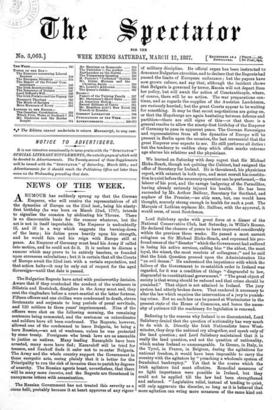The Bul g arian Re g ents have acted with praiseworthy decision. Aware that
if they overlooked the conduct of the mutineers in Silistria and Rnstchuk, discipline in the Army must end, they sent the ringleaders before a court-martial at the latter fortress. Fifteen officers and one civilian were condemned to death, eleven lieutenants and eerjeante to long periods of penal servitude, and 120 soldiers to three years' imprisonment. Nine of the officers were shot on the following morning, the remaining sentences being commuted, and the sentences on subordinates and soldiers have all been confirmed. The Regents, however, allowed one of the condemned to leave Bulgaria, he being a born Russian,—an act of weakness, unless he was protected by some treaty. Foreigners who break laws are aa amenable to justice as natives. Many leading Ruseophils have been arrested, many more have fled; Raraveleff will be tried for treason, and Zankoff finds it safer not to re-enter Bulgaria. The Army and the whole country support the Government in these energetic acts, seeing plainly that it is better for the Principality to run the risk of invasion than to perish by degrees of anarchy. The Russian agents boast, nevertheless, that there will be many more atettlea, and the Regents are threatened in anonymous letters with assassination.


































